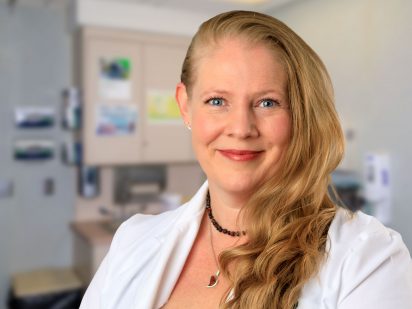Despite growing in popularity in recent years, midwifery is still a largely misunderstood profession. Thanks in part to centuries-old misunderstandings, midwifery often falls victim to these common myths.
MYTH: Midwives focus only on pregnancy and birth.
According to the American College of Nurse-Midwives (ACNM), midwifery encompasses a full range of primary healthcare services for women from adolescence to menopause and beyond.
“We provide care to women of all ages,” explained Jayme Burman, CNM, ARNP, a certified nurse midwife at Trinity Health.
Midwives can provide family planning and preconception care; do prenatal exams and order tests; watch a patient’s physical and psychological health; help the patient make a birth plan; advise the patient on diet, exercise, medications, and staying healthy; educate and counsel the patient during pregnancy, childbirth, and newborn care; provide emotional and practical support during labor; admit and discharge the patient from the hospital; deliver the child or make referrals to specialists when needed.
MYTH: Midwives have no formal education.
There are different types of midwives, each holding different certifications based on their education and experience.
Certified Nurse Midwives (CNM): Educated in both midwifery and nursing, CNMs earn graduate degrees, complete a midwifery education program accredited by the Accreditation Commission for Midwifery Education (ACME), and pass a national certification exam administered by the American Midwifery Certification Board.
Certified Midwives (CM): CMs are educated in midwifery. They earn graduate degrees, meet health and science education requirements, complete a midwifery education program accredited by ACME, and pass the same national certification examinations as CNMs.
Certified Professional Midwives (CPM): CPMs work exclusively in settings outside of hospitals, such as homes and birth centers. These midwives have completed coursework, an apprenticeship, and a national certifying exam.
Direct Entry Midwife (DEM): DEMs are individuals independently trained in midwifery through various sources that may include apprenticeship, self-study, a midwifery school, or a college/university program.
Lay midwife: A lay midwife is an individual who is not certified or licensed as a midwife but has received informal training through self-study or apprenticeship.
MYTH: Midwives cannot care for women with high-risk pregnancies.
“CNMs work in various roles. Some are employed by high-risk centers and focus only on that, while many work in collaboration with OBGYNs or family practice doctors to either co-manage or refer as appropriate,” Jayme explained, adding, “Our midwifery practice collaborates with an amazing, supportive group of OBGYNs.”
In a high-risk pregnancy, midwives offer resources to support the patient’s goals for childbirth, offer emotional support, and work alongside specialists to ensure a safe, healthy outcome for all.
MYTH: Midwives cannot prescribe medications or provide pain relief during labor.
As experts in labor pain relief, midwives work with their patients to develop a labor plan that is tailored to each patient’s needs and desires. Pain relief options range from relaxation techniques and movement, to epidurals and other medications.
“We love natural childbirth, but more than that, we love providing each individual patient with the experience that they desire, safely,” said Jayme. “That picture is different for each woman. We [midwives] can order medications, write prescriptions, and order epidurals as any obstetrics provider can.”
If a patient’s birth plan needs to be changed— out of necessity or if a patient changes their mind midwives will provide education on other options and assist in adjusting the plan.
MYTH: Midwives only attend home births.
While it is true that some midwives attend home births, most practice in settings like hospitals, medical offices, free-standing birth centers, and clinics.
“There are midwifes who do attend home births – usually CPMs and lay midwives,” explained Jayme. “CNMs [like those at Trinity] are more commonly found in hospital and office settings.”
According to the ACNM, in 2019, 89% of CNM/CMs attended births in hospitals, while 9% occurred in freestanding birth centers, and 8% occurred in homes.
Should you decide a midwife is the right medical provider for you and your needs, Trinity Health has a team of midwifery professionals eager to work with you.
“There is no better joy than being present for women when they have a baby, need to share, or simply have concerns,” said Jayme. “Caring for women and providing them access to comprehensive, compassionate care is simply one of the best ways I can contribute to our community and be a resource.”
Trinity Health’s Midwifery team includes: Jayme Burmann, CNM, ARNP; and Erica Riordan, MSN, CNM, located at Health Center – Medical Arts, 400 Burdick Expressway E, Minot. For appointments, call 701-857-7385. Gloria Berg, MSN, CNM, is located at Health Center – Town & Country, Ste 102, 831 S Broadway, Minot. For appointments, call 701-857-5703.

